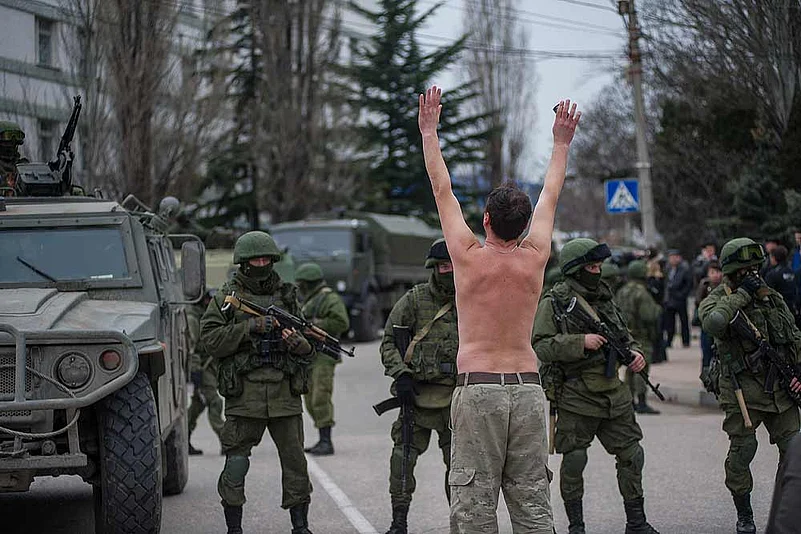Prince Hubertus zu Loewenstein, the German historian and diplomat, could never forget June 28, 1914. His parents were sitting in their castle grounds when a footman broke the news that a Serbian nationalist had shot dead the heir to the Austro-Hungarian throne. “Lower the flag,” the senior Loewenstein, who represented a branch of the Bavarian royal family, ordered, pointing to the family standard fluttering on the castle tower, and added in the same breath, “This means world war!” And so it did, despite a flurry of telegrams signed Nicky, Willie and Bertie, the Russian, German and British emperors who were cousins and called each other by their nicknames.
Not for nothing was World War I, the war to end all wars, called the Great War. The savage carnage (16 million dead, 20 million wounded) that prompted Siegfried Sassoon’s bitter lament, “The rank stench of those bodies haunts me still,/ And I remember things I’d best forget”, had not yet destroyed the romanticism of war. Staginess was sustained to the end, when one decorative Indian, the Maharaja of Bikaner, signed the Treaty of Versailles, at Britain’s bidding of course. Another, Lord Sinha, was present at the signing. No future war will be preceded by an exchange of imperial telegrams or a formal declaration of hostilities, with ambassadors given 24 hours to quit. But despite the absence of ceremony, the great powers can be drawn into local conflicts such as we are witnessing in Ukraine, South Sudan or the Central African Republic. They might cite the new mantra of human rights, invoke the holy grail of democracy, claim to be battling terrorism or unabashedly be bent on “regime change”.
Ukraine dramatically demonstrates that the Cold War is still with us. It is a reminder that Russia’s President Vladimir Putin called the Soviet Union’s collapse “the greatest geopolitical catastrophe” of the 20th century. It recalls even more vividly how Richard Nixon gloated over the collapse. “The time has come for America to reset its geopolitical compass,” he exulted. “We have a historic opportunity to change the world.” Zbigniew Brzezinski, who mentored Barack Obama at Columbia University, would have approved. A heady “manifest destiny” to dominate the world as global “regent” inspired Brzezinski’s book, The Grand Chessboard. But even a vanquished superpower can nurse delusions of grandeur and enjoy the means of bringing some of its dreams to life. Therein lies the scope for renewed conflict.
A similar imbalance at the end of World War I sowed the seeds of the conflagration that engulfed the world 21 years later. John Maynard Keynes’s The Economic Consequences of the Peace criticised the huge reparation payments imposed on Germany in 1918. A contemporary cartoon showed Woodrow Wilson, Lloyd George and Georges Clemenceau emerging from Versailles after the terms were announced. One of them says, “Curious: I seem to hear a child weeping.” Hiding behind a pillar, a little boy labelled “1940 Class” was crying his heart out.
Both wars invoked a lofty sense of mission transcending national interests. American media portrayals of Saddam Hussein’s villainy echoed Allied thunder against Kaiser Wilhelm’s “archaic militarism, vaulting ambition and neurotic insecurity”. Gallant little Belgium had to be defended, vulnerable Poland liberated, fascism destroyed. Mohandas Karamchand Gandhi urged Indians to help Britain in her “hour of need” because “the gateway to our freedom is situated on French soil”. A telegram reading, “Do not worry, England, Barbados is behind you”, must have cheered Herbert Asquith, then Britain’s prime minister.
The mythology of World War I survives: from the ‘Kitchener Wants You’ poster to Edith Cavell, the nurse who saved people from both camps and went to her death saying, “I can’t stop while there are lives to be saved.” From Mata Hari to Englishmen doffing their hats as they passed the Cenotaph whose replicas dot every major Commonwealth city. The red poppy of Remembrance Day and the Tomb of the Unknown Warrior in Westminster Abbey pay tribute to anonymous heroism. But as the essayist Beverley Nichols wrote, at the end of World War II “there was no unknown warrior because the illusions that had created him, and fashioned him into a figure of hope and beauty, were shattered for all time.” Concentration camps, pogroms against Jews, and Hiroshima and Nagasaki made World War II a decidedly ungentlemanly affair although some classical rules of engagement were still obeyed and the major powers were formally involved.
The basic reasons for conflict remain even without the rhetoric that clothed World Wars I and II in grandeur. Realpolitik is about spheres of influence, shipping lanes, access to markets and raw materials, and about energy sources. Japan, South Korea and some asean members feel threatened by China’s professedly “peaceful” rise. Every asean government disputes the so-called “nine-dash line” China submitted to the United Nations in 2009, claiming the entire South China Sea, including parts of the Philippines’ western seaboard. Japan furiously resents China’s unilateral declaration of an Air Defence Identification Zone restricting flights in international air space and affecting Japan’s claim to the Senkaku Islands. In turn, the Chinese denounce the Obama administration’s 2012 “Pivot to East Asia” strategy as aggressive. The Ukraine crisis is part of a bigger confrontation caused by NATO’s determination to absorb countries that were within Moscow’s sphere of influence.

Cross-continent war A Sept 1918 photo of American troops pounding German lines. (Photograph by AFP, From Outlook 31 March 2014)
NATO has helped to heal many of the world’s wounds. But Russians complain that its eastward push violates the reported assurance to Mikhail Gorbachev that NATO would not expand “one inch to the east” if Moscow agreed to German reunification. The combined military spending of all NATO members, constituting over 70 per cent of the world’s defence spending, could be justified so long as the eight-nation Warsaw Pact menaced the West. But that Soviet-managed military arrangement was liquidated in 1991. Yet NATO’s 12 original members have more than doubled to 28, and include countries that either border Russia or were formerly under Russian control. Six countries are waiting to join. If the West has its way, Ukraine will be next. The country may split. Civil war can break out, each side fronting for foreign powers.
The strategic maps that the US Pacific Command in Honolulu issued after the Soviet collapse showed nine “trouble-spots” that might erupt into conflict. Kashmir and Sri Lanka featured, but the most volatile were in West Asia, which is still bleeding from both world wars. The war to end all wars left behind many contrary legacies. The secret Anglo-French (Sykes-Picot) pact of 1916 ensured continuing instability by placing Iraq under a puppet king to secure the route to India and control the oil that had just been discovered. British conquest of Palestine made it possible to implement Arthur Balfour’s promise of “a National Home for the Jewish People”, ignoring both the indigenous population and Britain’s Arab allies, to whom the land had been promised. Lawrence of Arabia organised Arabs to bomb railways and bridges, and played on the ambitions of Husayn, Sharif of Mecca, who provided the manpower for sabotaging Turkish lines of communication. Thus was terrorism born under British auspices. Not surprisingly, the children of those Arabs take recourse to similar acts of violence against their perceived enemies.
The two world wars betrayed promises, exemplified duplicity and set horrendous precedents that changed the world. Three empires vanished. Artificial states like Czechoslovakia and Yugoslavia could not survive the logic of demographics. Poison gas was used for the first time, cavalry for the last. Aerial bombardment of civilian targets and submarine attacks against merchant shipping became commonplace. Censorship, official propaganda and patriotic reticence concealed most horrors from the public. Very little was written about Indian soldiers who rejected orders in Rangoon, Singapore, Belgium and Basra because they would not bear arms against Turkey whose ruler was also Caliph of Islam. Singapore’s Outram Park metro station bears witness to Britain’s ferocious justice: 37 Sikhs were shot there, and another 18 hanged in India.
The war also promised a brighter future under the League of Nations when Woodrow Wilson enunciated his famous Fourteen Points. Eight referred to specific war issues and six to global equity. He promised “open covenants of peace, openly arrived at”, freedom of navigation, disarmament, impartial adjustment of colonial claims, and removal “of all economic barriers and the establishment of an equality of trade conditions”. Clause 14, the most far-reaching, proposed “a general association of nations...formed under specific covenants for the purpose of affording mutual guarantees of political independence and territorial integrity to great and small states alike”. That was never fully realised. Wilson’s lofty principles excluded Asia and Africa. Congress rejected his prescription for the League, which itself foundered on Italy’s aggression against Ethiopia.
The need for an effective damage control mechanism has never been greater. Leaving aside such dangers as global warming, environmental degradation and the masses of economic refugees on the move, a multiplicity of sovereign states means a multiplicity of potential disputes. The curtain has rung down on the grand theatre of world wars. It has given way instead to mean but no less destructive acts of enmity like piracy, kidnappings, bomb blasts and so-called pre-emptive strikes that hold the ever-present threat of bigger powers either being sucked into quarrels or deliberately taking advantage of them to achieve their own ends. The involvement of Iran, Qatar, Saudi Arabia, Russia and the United States already makes the Syrian uprising something of a proxy war. Even if outright hostilities over Ukraine are avoided, this seems the sneaky pattern of future conflict.
Sunanda K. Datta-Ray, a senior journalist, has served as editor of The Statesman, Calcutta, and The Straits Times, Singapore.


























